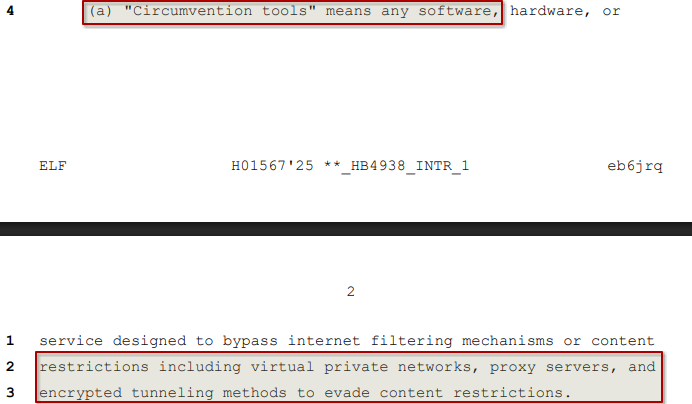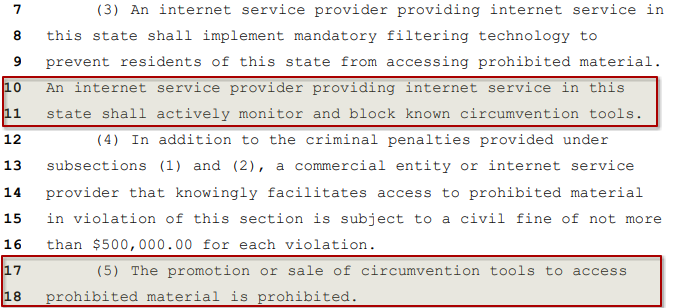Why House Bill 4938 Threatens Every Internet User
Michigan lawmakers have introduced House Bill 4938, deceptively titled the “Anticorruption of Public Morals Act,” but hidden within this bill is a shocking provision that would effectively ban Virtual Private Networks (VPNs) throughout the state. This isn’t just about restricting certain online content – this bill would strip away basic privacy protections that millions of ordinary Michigan families and businesses rely on every single day.
What This Bill Actually Does to Your Privacy
Don’t be fooled by the moral-sounding title. HB 4938 defines VPNs as “circumvention tools” and makes it a felony to distribute them. The bill requires your Internet Service Provider to “actively monitor and block” VPNs and makes selling or promoting these privacy tools illegal.


View the full bill proposal here: https://unshakled.org/wp-content/uploads/2025/09/2025-hib-4938.pdf
This means the government wants to know everything you do online.
VPNs Are Essential Privacy Tools for Everyone
Everyday Privacy Protection
VPNs are used by millions of ordinary Americans for basic privacy protection:
- Home internet users protecting their browsing data from ISP monitoring and data collection
- Public Wi-Fi users securing their connections at coffee shops, hotels, and airports
- Remote workers maintaining secure connections to company networks
- Families preventing advertisers from tracking their children’s online activity
- Travelers protecting personal data when using unfamiliar networks
- Anyone who doesn’t want their internet provider logging and potentially selling their browsing history
Business and Professional Uses
VPNs are standard business tools across industries:
- Small business owners protecting customer data and communications
- Freelancers ensuring client confidentiality
- Healthcare and legal professionals maintaining regulatory compliance
- Financial services securing sensitive transactions and data
- Any business that handles customer information or processes payments online
Critical Edge Cases
While most VPN users are ordinary people seeking basic privacy, these tools also serve vital functions for:
- Domestic violence survivors preventing abusers from tracking their online activity
- Journalists protecting sources and maintaining source confidentiality
Why Should You Care? This Affects YOUR Daily Life
Your Internet Provider Is Already Watching You
Right now, without a VPN, your Internet Service Provider can see:
- Every website you visit
- How long you spend on each site
- What you search for
- When you’re online and when you’re not
- And they can legally sell this information to advertisers
VPNs are the primary tool ordinary people use to prevent this surveillance. This bill would make that protection illegal.
Your Data Isn’t Safe on Public Wi-Fi
When you connect to Wi-Fi at:
- Starbucks or McDonald’s
- Hotels or airports
- Libraries or shopping malls
- Your workplace
Anyone on that network can potentially see your passwords, emails, and personal information. VPNs encrypt this data to keep it safe. Under this bill, protecting yourself would be illegal.
Protecting Your Family’s Privacy
Parents use VPNs to:
- Prevent advertisers from building profiles on their children
- Stop companies from tracking family internet habits
- Ensure their home internet activity stays private
- Protect against identity theft and online fraud
This bill would strip away these basic family protections.
The Government Wants to Monitor Your Every Click
This Is Unprecedented Surveillance
The bill requires Internet Service Providers to:
- Monitor all internet traffic from Michigan residents
- Block privacy tools without court orders
- Report on their surveillance activities
This level of internet monitoring has never been attempted in the United States. It’s the kind of surveillance you’d expect in China or North Korea, not Michigan.
Your Constitutional Rights Are at Stake
The Supreme Court has repeatedly ruled that Americans have a right to anonymous speech and private communication. This bill would:
- Eliminate anonymous communication online
- Force you to let the government track every website you visit
- Create a database of every Michigan resident’s internet activity
It Can’t Even Work
The technology requirements in this bill are impossible to implement:
- Modern internet traffic is encrypted – ISPs can’t tell VPN traffic from regular secure websites
- Privacy tools evolve faster than blocking mechanisms
- Attempting to block VPNs would break online banking, secure email, and other essential services
International Precedent and Reputation
Authoritarian Company
This bill would place Michigan in the company of authoritarian regimes:
- China’s Great Firewall: Similar VPN restrictions are used to control information access
- Iran and Russia: Both countries have attempted to ban VPNs to control their populations
- Digital rights rankings: Michigan would plummet in international digital freedom assessments
A Better Path Forward
Targeted Solutions
If lawmakers are genuinely concerned about online safety, there are constitutional approaches:
- Education programs: Invest in digital literacy and online safety education
- Support for families: Provide resources for parents to make informed decisions about internet use
- Existing laws: Enforce current regulations against illegal content without breaking the entire internet
Protecting Privacy Rights
Michigan should be leading on digital rights, not restricting them:
- Privacy legislation: Enact comprehensive data protection laws similar to Europe’s GDPR
- Corporate accountability: Hold tech companies accountable for data misuse
- Digital bill of rights: Establish clear protections for online privacy and security
Conclusion: The Stakes Couldn’t Be Higher
House Bill 4938 represents a fundamental misunderstanding of how the internet works and the role privacy tools play in protecting citizens’ rights and security. By attempting to ban VPNs under the guise of moral protection, Michigan lawmakers are proposing to:
- Strip away essential privacy protections from every resident
- Make the state uninhabitable for remote workers and tech companies
- Place vulnerable populations at greater risk
- Establish a dangerous precedent for digital authoritarianism
The choice is clear: Michigan can either embrace the digital future and protect its citizens’ rights, or it can join the ranks of authoritarian regimes that fear an open internet.
We urge all Michigan residents to contact their representatives and demand they vote against House Bill 4938. The internet – and democracy itself – depends on maintaining the right to privacy and secure communication.
Contact the Committee on Judiciary and your local representatives to voice your opposition to this dangerous legislation. Your digital rights are not negotiable.
